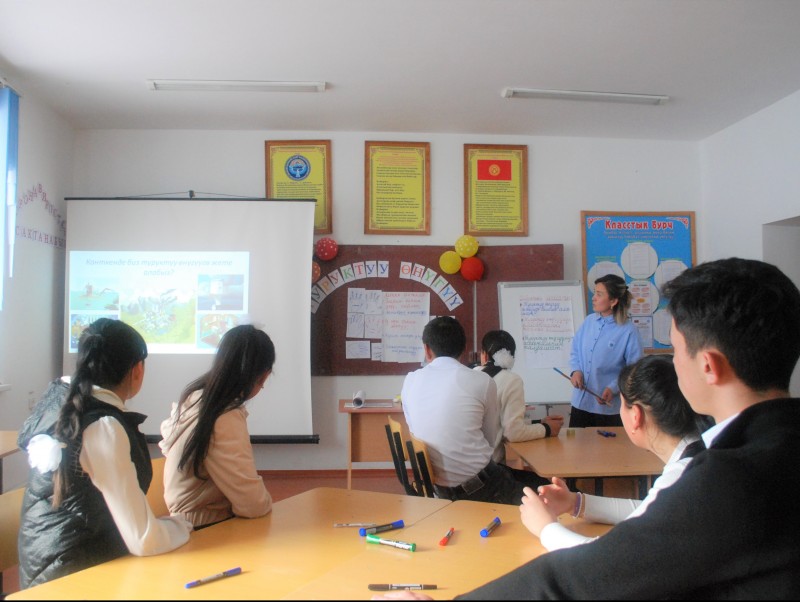
Geography and biology teachers from schools in Issyk-Kul and Naryn oblasts conducted open classes for high school students on sustainable development and the impact of climate change on Kyrgyzstan's natural ecosystems.
The lessons were the result of training in the impact of climate variability on ecosystems and biodiversity that the teachers received in October this year, facilitated by the CAMP Alatoo PF and as part of the project "Adaptation of mammals to climate change in Central Asia".In the open lessons, teachers together with pupils worked on sustainable management of forest and rangeland ecosystems, anthropogenic and climatic impacts on the environment. The teachers used a creative approach, including the use of visual content and outdoor activities, to explain the relationship between different natural phenomena and to reinforce knowledge of terms when covering topics that are difficult for teenagers to understand.
A teacher at the M. Tynayev School. M. Tynayev village, Orgochor village (Issyk-Kul oblast). Badiga Atakozueva, a teacher at Orgochor village school (Issyk-Kul region) showed a video on the Sustainable Development Goals to students and asked them to identify the ecosystem that plays an important role in ensuring the well-being of their villagers. In a brainstorming session, the students came to the conclusion that this ecosystem is pastures. The children also discussed factors affecting resource sustainability and prepared presentations. The second part of the lesson included practical work that took place in the pastures around the village. The students were introduced to simple methods of assessing the state of pastures and signs of degradation.
In the school named after Junush uulu Zhapar, in Ak-Terek village, Issyk-Kul province. Zhunush uulu Zhapar school in Ak-Terek village, Issyk-Kul region, was supported by students. The children prepared a presentation during which they used homemade posters and drawings to show the causes of climate change and weather, and expressed the significance of the 17 Sustainable Development Goals in short poems. This unusual way of presenting the material showed that the high school students had a firm grasp of the lesson topic, and the participants in the performance received certificates from the school administration for their creativity.
Asyl Kenzheeva, a teacher at the O. Toktosunov school in Dobolu village (Naryn province), spoke about the impact of human activities on ecosystems in her lesson. After the teacher and the pupils had broken down the concept of ecosystems and their services, the children organised themselves into teams, each of which discussed the threats posed to wildlife, pastures, forests and water resources. And these discussions ended with an answer to the question of how to change people's behaviour and attitudes towards resources.
In addition to the specialists from CAMP Alatoo PF accompanying the lessons, school leaders and methodologists from the district education departments were also present in the classrooms. They made recommendations based on the results of the lessons. In particular, there was a need for (1) additional training of teachers of geography and biology in the issues of sustainable development and natural resources; (2) provision of visual teaching material; (3) support and regular coaching from specialists.
Итоги пастбищного сезона 2018 года были подведены на очередном заседании районной пастбищной комиссии (РПК).
MoreThe development of the unified method, "Monitoring Pastures at the Local Level," is nearing completion.
MoreЧетыре новых моста построены в 2018 году в Кыргызстане при поддержке ОФ “CAMP Алатоо” и Швейцарской ассоциации “Памирские...
More